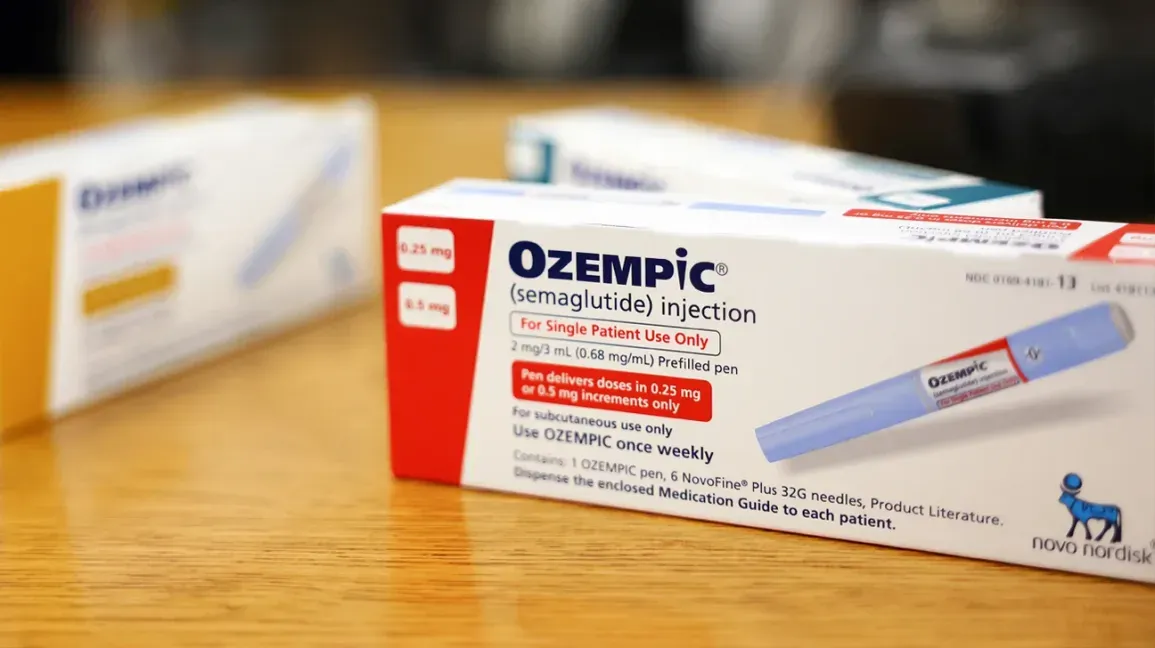Ozempic: The Weight Loss Wonder Drug That May Also Combat Cancer
A small study conducted at Maynooth University in Ireland found that this glucagon-like peptide (GLP-1) analog can restore the function of natural killer (NK) cells, which play a crucial role in preventing cancer.

Introduction
In recent years, the pharmaceutical landscape has been buzzing with excitement over a class of drugs known as glucagon-like peptide-1 (GLP-1) receptor agonists. Among these, semaglutide - marketed under the brand names Ozempic and Wegovy - has garnered significant attention. Initially developed to treat type 2 diabetes, these drugs have gained popularity for their remarkable weight loss effects. However, emerging research suggests that their benefits may extend far beyond shedding pounds.
A groundbreaking study from Maynooth University in Ireland has unveiled a potential new frontier in the fight against cancer. This research indicates that semaglutide and similar GLP-1 analogs may play a crucial role in reducing cancer risk, particularly in individuals with obesity. Let's delve into the details of this fascinating discovery and explore its implications for future treatment strategies.
The Semaglutide Revolution: More Than Just Weight Loss
Understanding GLP-1 Receptor Agonists
Before we dive into the cancer-fighting potential of semaglutide, it's essential to understand what GLP-1 receptor agonists are and how they work:
- Mechanism of Action: These drugs mimic the effects of a naturally occurring hormone called glucagon-like peptide-1 (GLP-1).
- Primary Functions:
- Stimulate insulin release
- Reduce glucagon production
- Slow gastric emptying
- Increase feelings of fullness
- Original Purpose: Treatment of type 2 diabetes
- Secondary Benefit: Significant weight loss in many patients
The Rise of Ozempic and Wegovy
Semaglutide, the active ingredient in both Ozempic and Wegovy, has become increasingly popular due to its effectiveness in promoting weight loss. Some key points about these medications include:
- Ozempic: Primarily prescribed for type 2 diabetes management
- Wegovy: Approved specifically for chronic weight management
- Administration: Both are administered via subcutaneous injection
- Dosage: Typically given once weekly
- Effectiveness: Many users report substantial weight loss, leading to the drugs being dubbed "miracle" weight loss aids
The Cancer Connection: A New Frontier in Obesity Treatment
The Maynooth University Study: A Closer Look
The recent study conducted at Maynooth University has opened up exciting new possibilities in the realm of cancer prevention. Here are the key findings:
- Focus: The study examined the effects of GLP-1 analogs like semaglutide on natural killer (NK) cells.
- Discovery: Semaglutide was found to restore the cancer-fighting abilities of NK cells in individuals with obesity.
- Mechanism: This restoration occurred independently of the drug's weight loss effects.
- Implications: The research suggests that semaglutide may directly activate NK cells, potentially reducing cancer risk.
Natural Killer Cells: The Body's Cancer-Fighting Superheroes
To understand the significance of this study, it's crucial to grasp the role of natural killer cells in our immune system:
- Definition: NK cells are a type of white blood cell that forms part of our innate immune system.
- Function: They play a vital role in recognizing and destroying cancer cells and virus-infected cells.
- Method: NK cells use a process called cytotoxicity to eliminate harmful cells.
- Importance: A robust NK cell population is essential for maintaining a strong defense against cancer development.
The Obesity-Cancer Link: Unraveling the Connection
The study's findings are particularly significant given the well-established link between obesity and increased cancer risk. Several factors contribute to this connection:
- Chronic Inflammation: Obesity often leads to a state of low-grade, chronic inflammation in the body.
- Hormonal Imbalances: Excess fat tissue can disrupt normal hormonal functions.
- Insulin Resistance: Often associated with obesity, this condition can promote cancer cell growth.
- Impaired Immune Function: Including the reduced effectiveness of NK cells observed in individuals with obesity.
Semaglutide's Cancer-Fighting Potential: Mechanisms at Play
While the exact mechanisms by which semaglutide may reduce cancer risk are not fully understood, several theories have emerged:
1. NK Cell Restoration
- Direct Activation: The study suggests that semaglutide may "kick-start" NK cells directly.
- Improved Function: This could lead to more effective identification and destruction of cancer cells.
2. Anti-Inflammatory Effects
- Inflammation Reduction: Semaglutide has demonstrated anti-inflammatory properties.
- Cancer Prevention: By suppressing chronic inflammation, the drug may mitigate factors that promote cancer development.
3. Blood Sugar Regulation
- Glycemic Control: As a diabetes treatment, semaglutide helps regulate blood sugar levels.
- Cancer Risk Reduction: Elevated blood glucose has been linked to increased risk of certain cancers, including liver, pancreatic, and colorectal cancers.
4. Weight Loss Effects
- Obesity Reduction: While not directly related to NK cell function, the weight loss induced by semaglutide can indirectly reduce cancer risk.
- Multiple Benefits: Lowering body fat can improve overall metabolic health and reduce inflammation.
Implications for Obesity Treatment and Cancer Prevention
The potential dual benefit of semaglutide in promoting weight loss and reducing cancer risk could revolutionize obesity treatment approaches. However, it's important to consider several factors:
Promising but Preliminary
- Small Study Size: The Maynooth University research involved a limited number of participants.
- Need for Further Research: Larger, more comprehensive studies are required to confirm these findings.
Multifaceted Approach to Cancer Prevention
- Lifestyle Factors: While semaglutide shows promise, it's crucial to remember that lifestyle choices play a significant role in cancer risk.
- Holistic Strategy: A comprehensive approach to cancer prevention should include diet, exercise, and other healthy habits.
Potential for Targeted Therapies
- Personalized Medicine: These findings could lead to more targeted therapies for individuals at high risk of cancer due to obesity.
- Immune System Modulation: Future treatments might focus on enhancing NK cell function in various patient populations.
Beyond Semaglutide: Holistic Approaches to Health and Weight Management
While the potential cancer-fighting benefits of semaglutide are exciting, it's essential to consider a broader perspective on health and weight management:
Sustainable Lifestyle Changes
- Balanced Diet: Focus on whole, nutrient-dense foods, including:
- Fruits and vegetables
- Lean proteins
- Whole grains
- Healthy fats
- Regular Physical Activity: Aim for at least 150 minutes of moderate-intensity exercise per week.
- Stress Management: Incorporate stress-reduction techniques like meditation or yoga.
- Adequate Sleep: Prioritize 7-9 hours of quality sleep per night.
Mindful Eating Practices
- Tune Into Hunger Cues: Learn to recognize true hunger versus emotional eating.
- Practice Mindfulness: Pay attention to the taste, texture, and aroma of your food.
- Avoid Distractions: Eat without screens or other distractions to better gauge fullness.
Building a Support System
- Professional Guidance: Consider working with a registered dietitian or nutritionist.
- Community Support: Join support groups or find an accountability partner.
- Family Involvement: Encourage family members to participate in healthy lifestyle changes.
The Future of Obesity Treatment and Cancer Prevention
As research into semaglutide and similar drugs continues, we may see a shift in how obesity and its related health risks are managed:
Integrated Treatment Approaches
- Combination Therapies: Future treatments may combine medications like semaglutide with targeted lifestyle interventions.
- Personalized Plans: Treatment strategies may be tailored based on individual risk factors and genetic profiles.
Expanded Research Focus
- Long-Term Effects: Studies will likely explore the long-term impact of GLP-1 receptor agonists on cancer risk and overall health.
- Mechanism Exploration: Further research into how these drugs affect NK cells and other immune functions may lead to new therapeutic targets.
Potential for Preventive Medicine
- Early Intervention: If confirmed, the cancer-fighting properties of drugs like semaglutide could lead to their use in preventive medicine for high-risk individuals.
- Broader Applications: Research may explore the potential benefits of these drugs in non-obese populations at risk for certain cancers.
Conclusion: A Promising Path Forward
The discovery of semaglutide's potential to reduce cancer risk by restoring NK cell function marks an exciting development in the fields of obesity treatment and cancer prevention. While more research is needed to fully understand and confirm these effects, the findings open up new possibilities for improving health outcomes in individuals with obesity.
As we move forward, it's crucial to remember that no single drug or intervention is a magic bullet for health. The most effective approach to reducing cancer risk and improving overall well-being will likely involve a combination of pharmaceutical interventions, lifestyle changes, and personalized strategies based on individual needs and risk factors.
For now, individuals concerned about their weight and cancer risk should focus on adopting healthy lifestyle habits while staying informed about emerging treatment options. As always, any decisions about medication or significant lifestyle changes should be made in consultation with healthcare professionals.
The journey to better health is ongoing, and discoveries like this remind us of the incredible potential of medical research to improve lives. As we await further developments in this exciting field, let's remain committed to making choices that support our health and well-being every day.




